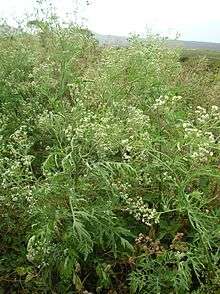Parthenium
| Feverfew Guayule | |
|---|---|
 | |
| Parthenium hysterophorus | |
| Scientific classification | |
| Kingdom: | Plantae |
| (unranked): | Angiosperms |
| (unranked): | Eudicots |
| (unranked): | Asterids |
| Order: | Asterales |
| Family: | Asteraceae |
| Subfamily: | Asteroideae |
| Tribe: | Heliantheae[1] |
| Genus: | Parthenium L. |
| Type species | |
| Parthenium hysterophorus[2][3] L. | |
| Synonyms[1] | |
| |
Parthenium is a genus of North American shrubs in the sunflower tribe within the daisy family.[4][3]
The name Parthenium is derived from either the Greek word παρθένος (parthenos), meaning "virgin," or παρθένιον (parthenion), an ancient name for a plant.[5]
Members of the genus are commonly known as feverfew.[6] Notable species include guayule (P. argentatum) which has been used as a rubber substitute, especially during the Second World War;[7] and also P. hysterophorus, a serious invasive species in the Old World.[8]
- Species[1]
- Parthenium alpinum (Nutt.) Torr. & A.Gray – Arkansas River feverfew - NM CO WY
- Parthenium argentatum A.Gray – Guayule - TX, Coahuila, Guanajuato, Nuevo León, San Luis Potosí, Zacatecas
- Parthenium cineraceum Rollins - Bolivia, Paraguay
- Parthenium confertum A.Gray – Gray's feverfew - AZ NM TX Chihuahua, Coahuila, Nuevo León, San Luis Potosí, Querétaro, Tamaulipas
- Parthenium fruticosum Less. - from Tamaulipas to Chiapas
- Parthenium hysterophorus L. – Santa Maria feverfew, whitetop weed - widespread in North + South America
- Parthenium incanum Kunth – mariola - NV UT AZ NM TX Chihuahua, Coahuila, Durango, Hidalgo, Nuevo León, San Luis Potosí, Zacatecas
- Parthenium integrifolium L. – American feverfew, wild quinine - from TX to MA + MN
- Parthenium ligulatum (M.E. Jones) Barneby – Colorado feverfew - CO UT
- Parthenium rollinsianum Rzed. - San Luis Potosí
- Parthenium schottii Greenm. ex Millsp. & Chase - Yucatán
- Parthenium tomentosum DC. - Oaxaca, Puebla
Uses
In North America, the Jicarilla Apache people used Parthenium incanum for medicine (Opler 1946: 8). The sap of guayule (P. argentatum) is a source of natural rubber.[9] It is often mistaken for marijuana because of it being referred to as a "weed".
Gallery
.jpg)
- Wild quinine (Parthenium integrifolium)
References
- 1 2 3 Flann, C (ed) 2009+ Global Compositae Checklist
- ↑ lectotype designated by N.L. Britton & A. Brown, Ill. fl. n. U.S., ed. 2. 3: 464 (1913)
- 1 2 Tropicos, Parthenium L.
- ↑ Linnaeus, Carl von. 1753. Species Plantarum 2: 988 in Latin
- ↑ Strother, John L. "Parthenium Linnaeus, Sp. Pl. 2: 988. 1753; Gen. Pl. ed. 5, 426. 1754.". Flora of North America. eFloras.org. Retrieved 2011-08-09.
- ↑ "Parthenium". Integrated Taxonomic Information System. Retrieved 2011-08-09.
- ↑ Ray, D.T. 1993. Guayule: A source of natural rubber. p. 338-343. In: J. Janick and J.E. Simon (eds.), New crops. Wiley, New York.
- ↑ "Parthenium hysterophorus (herb)". Global Invasive Species Database. Invasive Species Specialist Group. 2010-10-04. Retrieved 2011-08-09.
- ↑ Ray, Dennis T. (1993). J. Janick and J.E. Simon, eds. "Guayule: A source of natural rubber". New crops. New York: Wiley: 338–343.
- Everitt, J.H.; Lonard, R.L.; Little, C.R. (2007). Weeds in South Texas and Northern Mexico. Lubbock: Texas Tech University Press. ISBN 0-89672-614-2
- Opler, Morris E. (1946). Childhood and youth in Jicarilla Apache society. Publications of the Frederick Webb Hodge Anniversary Fund (Vol. 5). Los Angeles: The Southwest Museum Administrator of the Fund.
| Wikimedia Commons has media related to Parthenium. |
| Wikispecies has information related to: Parthenium |